
A Guide To Building Your Brand New Home
You can think about building a house if your preferred home isn't available on the market or if you want to design a home that is exclusively yours.
Choosing the floor plan, wanting everything in the home to be brand-new, and tailoring their home's elements were among the top factors cited by buyers who chose to purchase newly constructed homes.
The Truoba 3 bedroom houses are ideal for you, if you are looking forward to having more bedrooms in your new home. Are you ready top begin the journey of building your brand new home?
Remember that the construction process might differ from area to area and contractor to contractor, particularly if you're creating a complex bespoke home. Make careful to enquire about the builder's particular policies and practices.
Did you know that there are three options buyers might use when looking at new construction? Here they are:
Spec homes
A home builder creates a single-family home known as a spec home without having a specific buyer in mind. Instead, after it is completed, they intend to offer the property to a buyer. You might be able to choose some of the home's finishing touches, such as flooring, kitchen appliances, and paint color, based on how early in the entire process you are ready to enter into a contract. These homes are occasionally marked as "pre-construction" on the sales listing.
Tract homes
A developer buys a piece of property and divides it into separate lots to create a tract home. The homes in that planned neighborhood are then all built by one home builder. Condominiums, townhomes, or single-family homes can all be considered tract homes. There will be shared amenities and similar-looking residences in the majority of the neighborhood. Depending on the timetable, you might be able to choose some finishing in advance, much like with spec homes.
Totally custom houses
A fully custom home is one that you normally find the land for yourself before hiring a builder to construct. The floor plan, layout, and finishing are all up to you, but the process calls for careful planning, close attention to detail, and strict budgeting because custom homes may be pricey.
The process of building a home
You'll have to look around for the ideal lot if the land you want to build on isn't already yours. You can find properties for sale in your neighborhood with the assistance of a real estate professional. It can occur before or after the property is chosen, depending on your specific plans, but determining the size, layout, and design of your home is a huge undertaking. To make sure your home is structurally strong, complies with local code, and meets your demands, you'll need to have a number of different experts on your team. Construction will commence and your home will start to take shape once the plans and blueprints have been completed and your permits have been authorized.
Customized home construction is a challenging process that can take well over a year, based on your location, lot issues, house size, local regulations, and the permit-approval procedure. Remember to be patient while your dream home is loading.
Everplaces rebrands to focus on app-making-platform for travel brands and DMOs
For the last year, Everplaces has been powering two products simultaneously, the well-known travel tool app simply called “Everplaces” and a B2B tool for companies to make travel apps in a faster and better way.
From 1 January 2015 this will change, as we make changes in our business to split the products, and move focus to the app making platform.
Everplaces the app, which is used and loved all over the world, will continue running to support the community of travellers to find the very best insider tips for places to eat, sleep and play. It will retain the name and brand “Everplaces” and will be run by our wonderful designer cofounder Angelica Vargas, who will also find the time to work with other startups and brands to develop amazing designs, especially on mobile.
This strategic move enables us to focus our efforts inside the company on one product, rather than two. This is good news for all of our clients, such as German National Tourism Board, Urban Adventures, Epoque Hotels, etc., whose amazing travel apps are built on the platform. It will enable us to create travel related apps with even more advanced features, faster, easier and cheaper than ever before.
Till now, the app-making-platform has lived a life somewhat in the shadow of its larger sibling, Everplaces, a position it has now outgrown. The product will now get its own name, brand and resources. In this process, cofounder Christoffer Kaalund is stepping up as CEO. Christoffer is the technical mind behind the app-making-platform and knows it better than anyone else. Current CEO Tine Thygesen has decided to move on, and will only be involved in a non-operational capacity going forward.
Sometimes when you have two good things you have to make the hard choice to separate them, so each can grow and develop in its respective way. This is what this split allows us to do, and we are thoroughly convinced that it is the best way to serve our investors, clients and community. In fact, we are very excited about the new stage.
Don’t hesitate to be in touch if you have further questions.
Tine Thygesen, Christoffer Kaalund and Angelica Vargas
Cofounders, Everplaces
More info:
Everplaces travel app: everplaces.com, and Apple App Store.
App-making-platform: business.everplaces.com
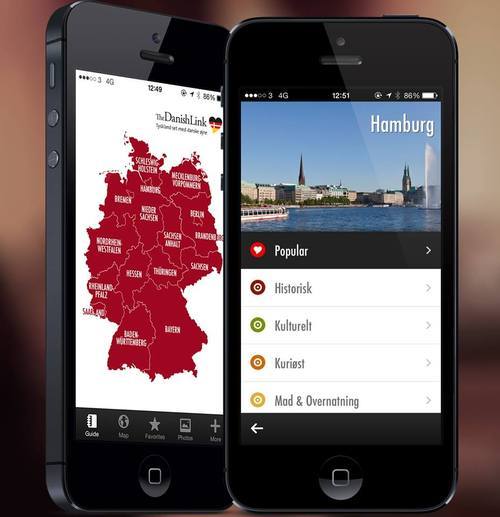
Share the most memorable place you’ve stayed at and be in to win a free hotel stay
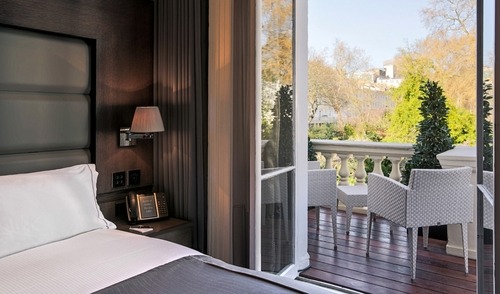
Have you ever stayed in a cool or unique hotel or do you know of any in your city? A beautiful design hotel, a romantic escape, a place with extraordinary service, a room with great views, you name it. Share the most memorable place you have stayed at and enter our competition to win a EUR160 voucher for a free stay, in any city where Hotel Tonight is present.
All you need to do is add the hotel to Everplaces and share it with us. All entries should include images and notes explaining why they were a special/unique place to stay, and you can submit as many places as you know :)
We’ll be putting together a collection with unique places to stay around the world based on the best entries of the competition.
Deadline is: Friday, June 27th.
To enter the competition, you can post the link to your hotel on our Facebook page or send the link to Ani, our Community Manager, at [email protected] before June 27th.
The winner will be announced by June 30th.
Looking forward to seeing all those beautiful places!
Crisis management: How mobile can help travel companies help customers stuck in an emergency
Big news: Commerce comes to maps
In the recent Google Maps update a hard-to-spot new feature was included, which is in fact a huge step for the location-based vertical - commerce has come to maps!
The new version allows users to “Book Uber” (this is a taxi from the american taxi corp. of same name), from inside the navigations menu. This little button is a huge milestone, because it marks another shift in location-based technology.
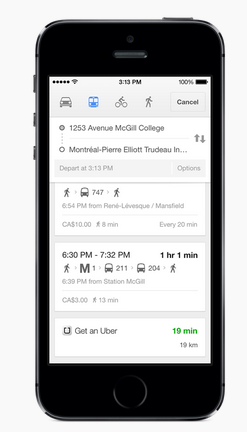
Why does it matter?
The last 5 years has seen a silent shift in the way we find information: from traditional information to map-based information.
It all started with “nearby”, the fact that the map opens in your current location, which your guide book (if traveling) or Yellow Pages (if at home) did not. This made it easier for consumers to find nearby services, restaurants and companies if they opened Google or Apple maps, than if they used the guide books, brochures and listing services previously favored. This started getting people to search directly inside the Map apps, rather than in the mobile browsers, because they would get better results as it would take location into consideration too.
Since then, Google Maps in particular has continued to include a million small bits of information to each place, which totals to a gigantic improvement in usefulness. They’ve added opening hours, contact info, reviews, photos and descriptions of the places. Combined with the new trend that people travel less prepared this was a killer advantage compared to static form info.
And today, we’re seeing the next step for maps to step out of their supporting role, and into a lead role, because this is the first clear opportunity to start buying directly from the map interface.
We’ve been talking about this in our talks at conference about travel and mobile, and you can see more of our predictions in our knowledge center.
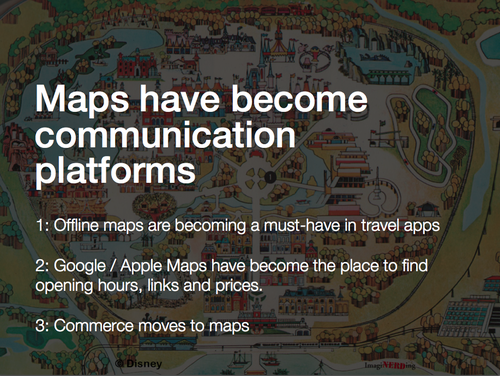
More about the new features rolled out here
Context beats all, especially on mobile
Context and relevance is the new frontier in marketing, as you’ve probably already heard. And mobile has an amazing advantage when it comes to contextual search, because we automatically know more about the consumer than we do when they search on web, as an example
- your exact location
- time of day
- weather where you are
This enables us to offer more contextual and relevant offers (rather than generic spammy offers). With commerce in maps, you can easily imagine that we start linking our current needs to commerce; such as sunblock for beach goers, lunch offers at mid day, m-tickets if near an attraction. Anything which you can add the words “required right now” in front of, is a perfect option for contextual, map based commerce.
It’s a brave new world. Of maps.
Tell us the best places to eat in your city to win a free stay for your next trip
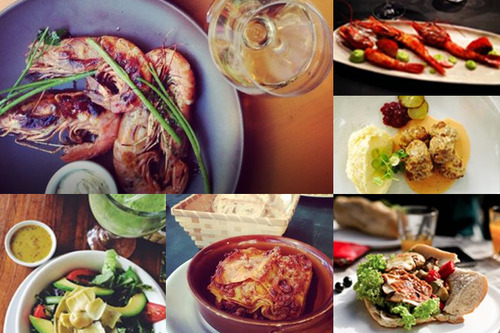
We’ve all tried them. Places, where the food is not just food, but a pure pleasure. Take us through a gastronomic journey of your own city and enter our competition to win a EUR160 voucher for a free stay, in any city where Hotel Tonight is present.
All you need to do is create a collection in Everplaces with the theme “Best places to eat in my city” and share it with us. Your collection should include at least 10-12 food related places and all of them need to have images and notes explaining why they made it to your collection.
Deadline is: Thursday, June 12th.
To enter the competition, you can post the link to your awesome Everplaces collection on our Facebook page or send the link to Ani, our Community Manager, at [email protected] before June 12th.
The winner will be announced by June 13th.
We can’t wait to see all your delicious places!
Share your tips and win a free one-night hotel stay
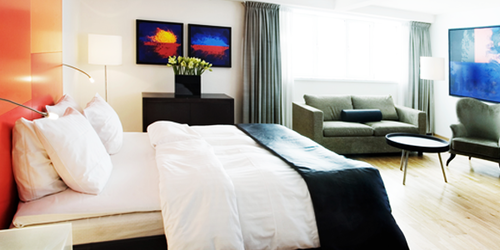
Think of one of your favorite cities. Then think of all the cool places you love there… and here comes the exciting part:
Create a mini guide for your favorite city and get a chance to win a EUR160 voucher for a free stay, in any city where Hotel Tonight is present.
All you need to do is create a collection in Everplaces with the theme “A short getaway to… [ your favorite city ]” and share it with us. Your collection should include at least 10-12 places related to food, drink, hotels, culture, or anything that would make someone else fall in love with your favorite city. All the places need to have images and notes explaining why they made it to your collection.
Deadline is: Thursday, May 8th.
To enter the competition, you can post the link to your awesome Everplaces collection on our Facebook page or send the link to Ani, our Community Manager, at [email protected] before May 8th.
The winner will be announced by May 12th.
We can’t wait to see all your wonderful places!
Apps still beating mobile web, by 6 to 1 minute spent!
Six years into the race for your attention on mobile, apps are winning. A recent report by Flurry, who sits on the world’s most detailed mobile analytics, show that Americans are spending 6 minutes in apps, for every 1 they spend on mobile web.
Apps were considered a fad by some, but statistics clearly show the opposite trend
It has been widely speculated that consumers were getting tired of apps, and that mobile web was the future, however the stats show the opposite.
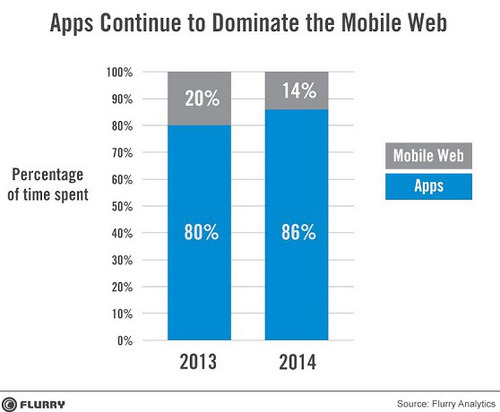
It looks like consumers actually consider the mobile browser to be “just another app”.
Travel apps are popular
The new statistics are in line with the general trends in the travel industry, where recent reports show that almost half of people have travel apps on their phones, and 26% have several.
Branded travel apps and destination apps should probably aim to conquer the “download, use, retire” app segment, where consumer downloads an app to use specifically during their holiday and they retire it to the back of their phone afterwards, similarly to how they would use a travel guidebook. This is a time where travelers are actively looking for help, and where brands and DMOs can play a positive role.
Alternatively (or concurrently), travel brands could ensure their content is well placed in the apps that are battling for the “preferred global travel app” market, such as Foursquare, TripAdvisor and our own Everplaces app.
The time to invest in apps in now
Given consumers are likely to download only a certain number of apps, the investment in getting into the market is only going to increase. Therefore, now is a good time to start investing in your app presence, as pointed out by Lee McCabe, Facebook’s Head of Travel at IBT recently.
Facebook themselves have been amongst the most aggressive investors in mobile, and are seeing that investment paying off. Between the Facebook app, Instagram and WhatsApp they sit on a large percentage of the usage now, especially compared to Google’s meager 5% spent in their mobile web browser.
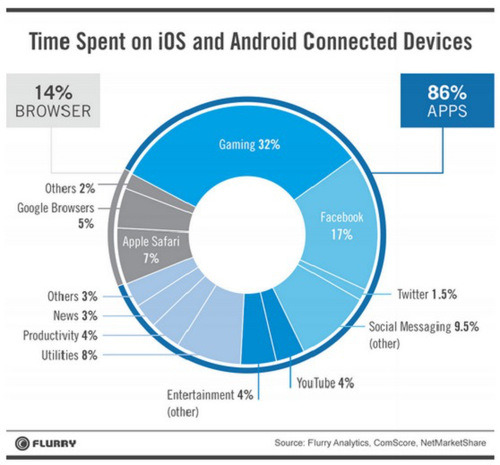
Time on mobile has grown, again.
4 precious minutes more, that’s what the average American spends more per day on his mobile compared to last year, that’s 2.5% increase.
The total time spent on mobile is now a whopping 2 hours and 19 minutes per day!
Native apps, not web apps
The report is major vindication for native apps (developed in iOS, Android, etc, the software the actual phones run on).
86% of time on mobile (US consumers) is spent in native apps. So, despite web apps (also called HTML5 apps) getting a lot of attention, because they in their one-size-fits-all nature, are cheaper and faster to develop. But the performance is simply not keeping up with native apps, which has also made big companies like Facebook and LinkedIn shift to native apps. For the record, the 70 apps developed by Everplaces are also all native apps.
“It is still too early to predict the trajectory apps will take in 2014,” Flurry said. “But one thing is clear — apps have won and the mobile browser is taking a back seat. Now every company in the world, including Google, is adjusting to that reality.”
….
- Venture Beat: The mobile web is still losing out to native apps, by more than 6 to 1
- Flurry: Apps Solidify Leadership Six Years into the Mobile Revolution
Considering an app? Let us help! It can be faster and cheaper than you think. Email [email protected]
Android vs iPhone, why you should start on one platform
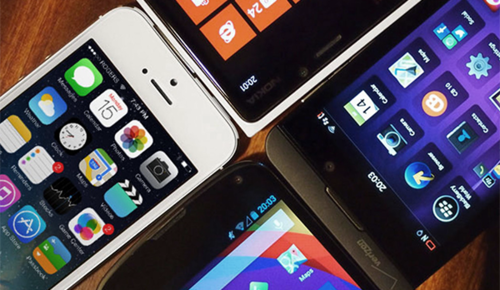
Every marketeer would like to reach as many people as possible. So why is it a good idea to start building your app only on one platform?
The team at Everplaces has built 70 apps, both for Android and iOS. Based on our experience with that, here’s why we suggest starting simple, it could end up saving you a lot of time and money.
1) It’s not the build, it’s the maintenance
Most people calculate a budget for building their apps. They agree on a feature set with the developer who starts building and everyone is happy. But what about the maintenance costs? What surprises most people about development is that the product isn’t just built and then it works, it has to be constantly improved, tweaked and bug fixed.
For one, the platform providers keep coming out with new updates you have to be compatible with. For example, when Apple released the iPhone 5 we suddenly had to make all our apps fit the new taller design of all the pages (iPhone5 is taller).
Then Apple came out with iOS7, the new operating system which has “flat design”. This meant that to keep looking good, we had to redesign the icons, reconsider several pages, and had to decide what to run with in the changeover period, where we have users on both systems.
And this is just the platform provider, we also connect with Facebook, Twitter and a number of other services which constantly update the integration. Recently we spent a month building a deep Facebook integration, which was offered to us because we have a special partnership with Facebook. Four days after we released it with big hurrah, Facebook changed something at their end and a lot had to be rebuilt.
For every platform you’re on, integrations and functionality have to be rebuilt all the time. Do you really have resources to do that, or will you become bogged down in maintenance so you can’t develop new features or grow your business? So set aside 20% of your building budget for updates during the next 12 months. Or choose a provider who includes updates in their prices (hint hint).
2) The audiences behave differently
Users on iPhone are more valuable than on Android. That’s an objective fact. They download more apps, they use more of them and they spend more money via their phone.
To a wide extent, you can predict behavior based on which phones people have bought. In the case of Everplaces the app, we have an app targeted urbanites and food lovers. These people tend to be on iPhones because they appreciate that the user experience is usually better on iOS devices. (This is both because of the superior design on the hardware, but also because of the strict guideline Apple impose on all software distributed through the App Store.)
So when choosing the right platform to start with, you could consider what’s important to you in terms of in-app purchase, upfront app purchasing, business vs personal usage, average income of users, etc.?
Because of the above, we recommend starting with iPhone or iPad apps.
3) Designing for Android is filled with compromises
It is correct that the Android user base is growing the fastest. Currently their market share is 70.4% in Europe and 52% in the US (vs Apple’s 17.8% Europe and 41% US).
While most of this growth comes from a lower-income demographic, who probably isn’t your target audience, it still feels natural to ask whether it wouldn’t be best to start with Android. The below image is why the answer is no.
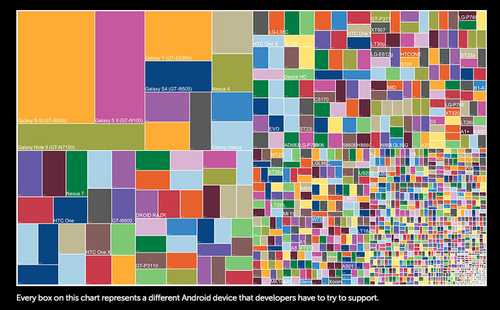
The image shows all the different formats you have to consider when designing for Android. There are simply so many screen sizes and resolutions that you have no fighting chance to deliver a good user experience for all of them. No matter what you do, you’re compromising. Compromise isn’t great user experience.
4) Delivering a consistent brand experience
We have to admit it, we once fell for the temptation to build on a second platform ourselves, since we had so many user requests for Android. But as soon as we started testing it the truth was obvious. It was simply a worse experience than the iPhone app, it looked less pretty, it was slower and clunkier. Most of this was because of the compromises we’d have to make to fit so many screen sizes.
For a company with strong design DNA, and a product that’s renowned for its UX, we couldn’t live with the poor user experience. So we had two choices; shift the majority of our efforts from iOS to Android, or live with a worse experience. We chose a third, and pulled the app back, despite the many requests. We lost hundreds of hours working on it, which we could have spent optimizing our core experience.
5) Reiterate, Perfect and then Expand. It worked for Instagram
Most companies have limited resources and have to use them wisely. You’re probably up against competitors who have more people and budget than you. Therefore it may be a better strategy to be world-best at something. Kick ass at one smaller field, rather than be average at a whole range of things. If you start with one platform, you can test, fine tune, get the metrics right, observe how people use it, adjust the features and tweak the design.
When it’s perfect, absolutely perfect, then you build it for the second platform.
Staying on one platform during the exploration phase halves your development costs in that period.
Instagram famously stayed on iOS until they had 30mil users. Only then was it perfect enough that they were convinced it should be replicated to Android. They did, and the user base sky rocketed.
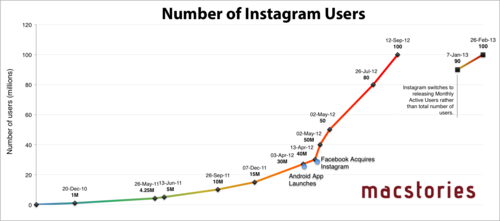
6) The hidden platforms
Most brands don’t only connect via mobile, but also on web. As an example, in the case of Everplaces the app, even though we’re focused on mobile, we’ve got to consider 7 platforms.
We’ve got a web interface, so we are actually always building and testing on iPhone, iPad, iPod, Safari, Chrome, Firefox and Internet Explorer, plus some smaller browsers and mobile versions of some of them. All of these come in many different versions, so some of them count as four or five. So that’s like 30 experiences to consider. That’s a lot for as a small team who want to develop fast.
7) What about Windows?
If you are building apps for the general consumer you don’t have to worry about Windows phones, Blackberry or other of the smaller platforms to begin with.
While Windows are gaining a bit of market share, it just doesn’t pay off. There’s two reasons. The first is that there is limited consumers on that platform, but it’s just as hard and expensive to build for. And secondly, because the users of those phones are used to not being able to get the apps they want, since most apps are missing from that app store.
So unless you’re in a very particular segment (like certain American B2B segments, where Blackberry still leads) you can stick to the two major ones. At least until your apps are hugely popular or you have done everything else you want on the main platforms and have budget to spare.
Conclusion
Different platforms will be good for different companies, we are not arguing that Android is inferior to iOS. What we are arguing, however, is that you can make a better mobile app, for less money, if you start with one platform, and then watch and learn. Once you’re convinced your app is perfect, then you have it built for the next platform.
Good luck selecting the best for your company. Let us know if we can help.
The space for mobile travel will be dominated by apps, says Facebook.
Facebook Head of Travel Lee McCabe spoke today at the international travel conference ITB, where he predicted that apps will account for the majority of time spent on mobile. He believes the brands who invest in building app followings now are in a good position for the future, where people will trust fewer apps for more of their decision-making and transactions. Well said, we say!
Everplaces wins top Innovation Prize, plus shortlisting for 6 awards
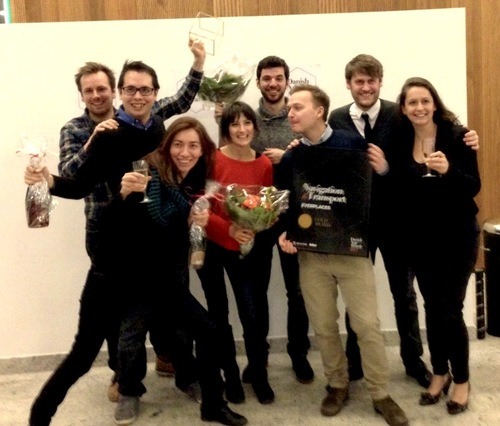
Last night was a good night for team Everplaces. We took home two major prizes and a host of short listings in the prestigious Danish App Awards.
- Winner: Category of transport and navigation
- Shortlisted: Category of Events and Tourism
After the winners in each category were given, the time came to prizes for the best app overall in each of the important app disciplines. As we live and die for making quality apps, we see this as particularly. Therefore it was an enormous honor to find the jury had shortlisted us for every single one of these awards!
- Winner: Innovation Award
- Shortlisted: Best Design
- Shortlisted, Best Usability
- Shortlisted, Best functionality
- Shortlisted, App of the Year
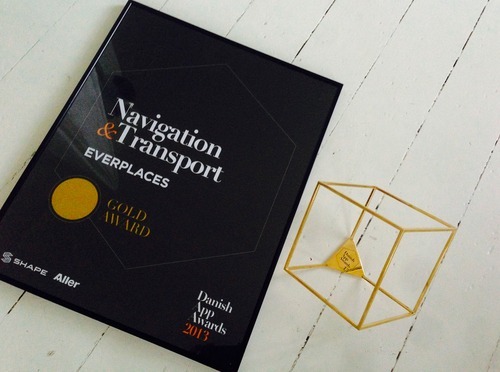
The short listing for Events and Tourism was particularly important to us, as the nomination was not for the app “Everplaces”, but for Copenhagen Cooking Festival, which we have made together with our partners at Wonderful Copenhagen.
Top level competition
The competition for the awards, and for even making it to the final, has been incredible tough. Denmark is on the forefront of mobile usage and development so the standard of innovation and programming is high.
This is not surprising, as the country has one of the highest smart phone penetration rates in the world, and 200 hundred years of tradition for engineering and design.
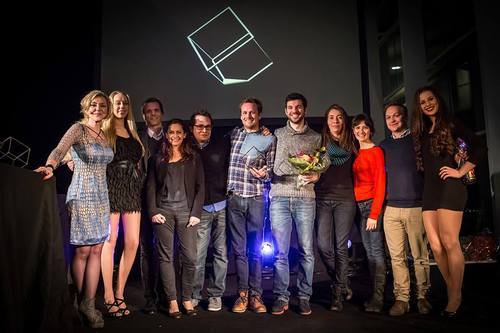
Here’s a full list of the winners
Disciplines:
App of the Year: Mobile Pay - Danske Bank, Trifork & In2Media
Best design: Classic Winnie-the-Pooh - Egmont & Shape
Best functionality: Mobile Pay - Danske Bank, Trifork & In2Media
Best usability: Nabby - Nabby og Trifork
Aller Innovation Award: Everplaces – Everplaces
Categories:
Games: Pack a Puzzle (Guld) - Set Snail & Hello Monday
Sport & health: Min Hovedpine (Bronze) - De Allierede, Frankly Web & Pfizer Danmark
Lifestyle: Minibar (Guld) - Shape
Tools: Haze (Sølv) - Robocat & Taptanium
Finance: Mobile Pay (Guld) - Danske Bank, Trifork & In2Media
Education & Kids: Nabby (Guld) - Nabby og Trifork
Shopping: (Sølv) - Lauritz.com, Hello Group & Spoiled Milk
Navigation & Transport: Everplaces (Guld) - Everplaces
Events & Turisme: Distortion 2013 (Sølv) - Shape
News and Reference: Den Danske Ordbog (Bronze) - Det Danske Sprog- og Litteraturselskab, Sylvain Fay-Châtelard & Miracle
